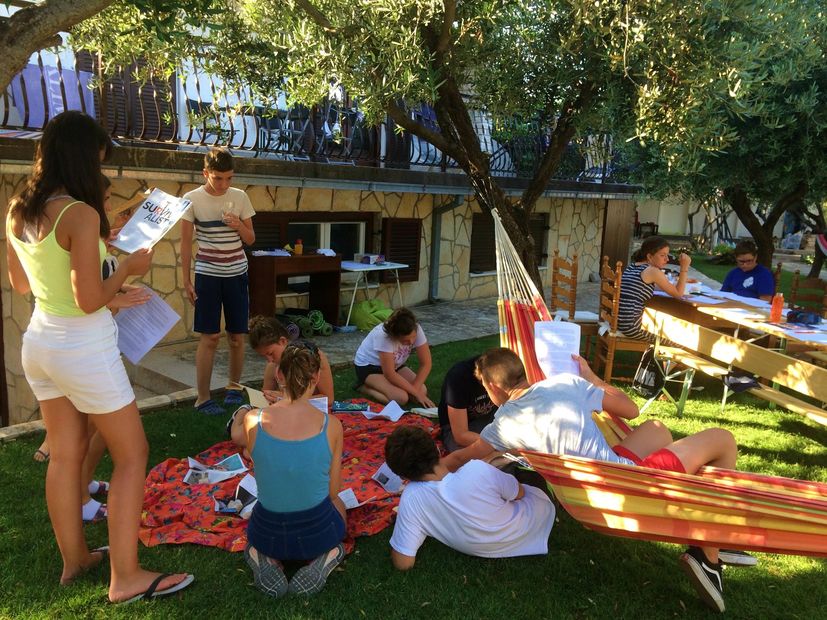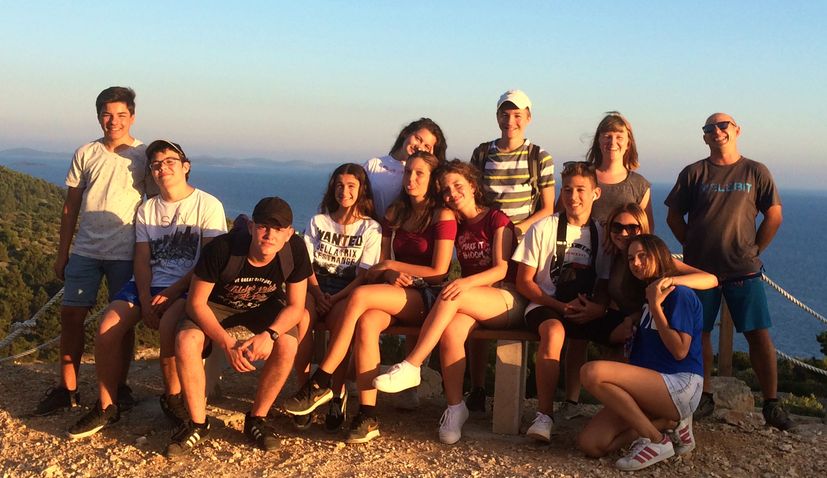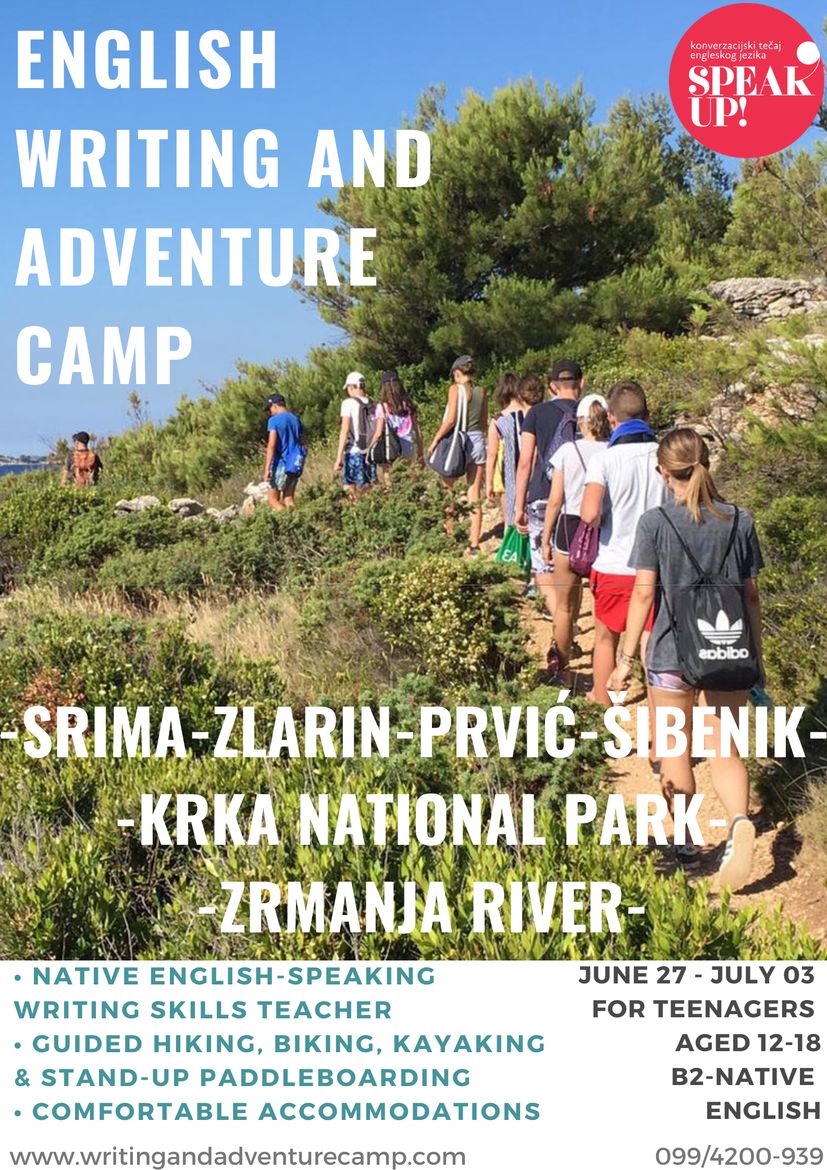American-Croatian helping locals improve English writing skills on an outdoor adventure
- by croatiaweek
- in News

Speak Up!’s English Writing and Adventure Camp
Those who enjoy writing know that writing itself can be an adventure. But when writing classes are combined with outdoor activities and trips to some of northern Dalmatia’s most beautiful destinations, even the most reluctant teens give writing a chance.
This is precisely what happens at Speak Up!’s English Writing and Adventure Camp, now in its third year and in a new location.
“We’ve taking things up a notch this year,” explains camp coordinator Jelena Primorac, an American-born Croatian who returned to Croatia in the 1990s.
While the educational part of camp still includes a crash course in key writing techniques, taught in a laid-back environment with highly individualized instruction and workshopping, the adventure part takes campers off to a different location every day in this year’s edition of the camp.
“Previously we stayed put on one island and did all our activities there. This year we’ve moved our base to the mainland so we can easily jet around and take our hiking, biking and kayaking to diverse locations,” says Jelena. The excursions include trips to Zrmanja River, the islands of Prvić and Zlarin, the city of Šibenik, and Krka National Park. “I’m super excited. Lots of parents are asking when I’ll make a version of the camp for moms and dads,” she laughs.
Explaining further the writing component of the camp, Jelena, an English teacher from Pennsylvania with a Master’s in Teaching Writing from Johns Hopkins University, says she loves seeing kids come into camp thinking that writing is something they just can’t do—it’s too hard or too boring—and then leave a week later with a text in hand that they are proud of. “I love seeing that transformation, and know how important it is to show kids that writing not only doesn’t have to be hard, but that it can also be fun.”
She goes on to say that one of the hardest parts about writing, for most young learners, is knowing what to say. “I don’t know what to write. I have nothing to say. I hear that from new students all the time. But that leads to something else I really love about teaching writing—seeing students explore what they think and feel about various topics through the process of writing itself, and also through the discussions that are part of our work. That’s one of the most magical things about writing, I think, that process of self-discovery.”

Group photo
As an example, Jelena describes an assignment she assigns during her 15-week introductory writing course for teens. After a class where they explore word connotations, she asks them to write an informal text about a word they really like for homework.
“One single word as the topic of a writing assignment—you can imagine how this sounds to anyone who isn’t particularly verbose. But this assignment has produced some of my favorite pieces of student writing,” she tells us.
She goes on to tell us about one particular example of what one student wrote for that assignment.
“I love reading student writing, and a lot of it blows me away for one reason or another. But this text here, by one of my younger students—I’ll just say that I read it to one of my friends and she said she wants to hire him,” she laughs. “His name’s Niko and he’s just twelve, so his texts are still fairly short, but boy do they pack a punch!”
We here at Croatia Week gave the text a read and were equally impressed, and are sharing it below for readers to enjoy. The budding young author wrote this particular text just after his class finished going through the basics of essay writing which are covered at camp, Jelena explains.
“Camp is a condensed version of the first 10 weeks of the 15-week introductory writing skills course I run in Zagreb and online. The idea is to give kids all the basics they need to write a solid text. I think Niko’s homework assignment shows what it equips them to do. This is a text that went through zero rewrites—it’s literally his first and final draft.”
Parents interested in learning more about the Speak Up English Writing & Adventure Camp can visit the website, here, or write directly to Jelena at [email protected]. Those interested in semester-long writing skills classes during the schoolyear can also find out more by contacting Jelena at the above address.

And now an informal homework assignment written by twelve-year-old Niko M. of Zagreb.
HOMEWORK
We all have that one word that we prefer. That word is a symbol of happiness for us, or maybe it reminds us of old times when we just started learning English. For me that one word makes me think I’m very smart. The word is perfunctory.
The meaning of that word is something that is done without paying much attention to it. For example, when my English teacher asks me: “Why is your homework incorrect?” or “Why aren’t you listening?”, I tell them that I’m listening to them, but I’m doing a perfunctory review of their class and homework. The look on their faces when I say that is worth millions. Of course, I don’t use that word a lot lately because teachers would probably give me an F or call my parents, but that word is my all-time favourite, and I will never forget that feeling of being wicked smart because of using that word. And don’t get me wrong, all words can be powerful and make you look smart, but only if you use them right.
In conclusion, I can say that writing this essay was a lot of fun and it brought back some good memories. Remember that you don’t need to be the most intelligent person on the planet just to communicate with other people and use powerful words. I hope you have a good day, and just so you know, I wrote this essay perfunctorily.

